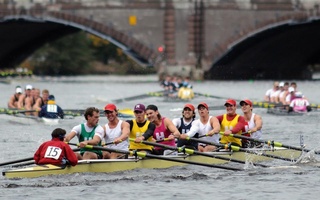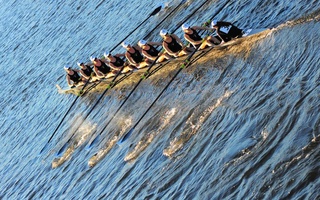
The first varsity eight of the lightweight crew team overcame a slow start to finish second, by just two seconds, behind Princeton on Sunday at the 2014 Head of the Charles Regatta.
This weekend’s Head of the Charles Regatta proved that it’s not always about how you start, but about how you finish.
Despite struggling at the start of the races, many boats from the Harvard men’s crew teams were able to improve throughout their races to end strong. No crew tallied an outright race victory, but Crimson entries earned top three finishes in the main races for heavyweight and lightweight eights.
HEAVYWEIGHT
While the Harvard heavyweight 1V may have had technical difficulties beginning its race, finishing was a different story.
Despite an early mix-up that caused the Crimson’s first eight to start, stop, and start again, Harvard’s premier heavyweight boat maintained a consistent clip to a top three finish in the men’s championship eights. The Crimson, which was the fastest college boat, earned third place for the second consecutive year with a time of 14:29.66 over the roughly three-mile long course.
The only boats to row faster than Harvard were manned by veteran post-collegiate crews known as “Great Eights.” Of the sixteen rowers that composed these Great Eights, fifteen had Olympic experience.
“We were in the thick of some really fast crews, so we knew we were going to be working off of them,” senior coxswain Jack Smith said. “It meant that we had a really good measuring stick, a litmus test with which to gauge ourselves. That was a good way to keep us motivated.”
But early in the race, international crews threatened to pull away from the Crimson boat, which was stroked by senior Charles Risbey. In particular, the French national boat, which started after Harvard, began to crowd the Crimson from behind.
“We held our ground,” sophomore four-seat Ross Jarvis said. “We sort of stuck to our guns, stayed at a constant speed, and pulled away towards the end. Our [coxswain] did a good line.”
Craftsbury, the boat that won, pulled rowers from eight different countries, including the Czech Republic, the Netherlands, Croatia, and the U.S. This international crew finished 3.36 seconds ahead of Taurus, the other Great Eight boat which sat former Harvard oarsman Henrik Rummel ’09 in the three seat, and 9.43 seconds ahead of Harvard. The second varsity in the heavyweight championship eights finished 29th out of a field of 36.
In the men’s club eights, two freshman boats rowed to third and eighth place in a crowded field of 47 boats. The third-place boat rowed evenly throughout the race and ended 13.14 seconds behind Northeastern, which won the event by edging out Brown.
In an equally large field of 52 boats, the Crimson heavyweight four rowed to a 33rd-place finish.
LIGHTWEIGHT
For the second straight Head of the Charles, Harvard placed second in the men’s lightweight eights. Although the Crimson started slowly, the first varsity picked up the pace in the final half of the race to end two seconds behind Princeton.
At the first official time check of the race at Riverside Boat Club, 10 of the 17 boats were within four seconds of Harvard. However, increased speed widened this margin until every crew besides Princeton and Cornell had dropped back at least seven seconds by Weld Boathouse.
Despite a second-place finish in a talented field of 17, half the oarsmen, such as sophomore stroke Emanuel Ritschard and coxswain James Dreben, are in just their second season of collegiate competition. Of the eight athletes in the 1V boat, only one, five-seat Michael Wales, is a senior.
The second varsity in the lightweight race experienced early difficulties. Sidetracked by the slowest start of any lightweight crew, the Crimson’s 2V had to make up time from the beginning and finished in 14th place.
Fourteenth place had a very different meaning to Harvard’s lone lightweight entry in the men’s club four. In a mixed-weight field of 52, the boat’s 17:25.15 performance placed the Crimson near the front of the pack, nearly 20 spots ahead of the Harvard heavyweight quartet.
Harvard’s most impressive result of the two-day event was not recorded by a current student. In the championship singles, former Harvard lightweight rower Andrew Campbell ’14 pulled away from Kjetil Borch, the two-time defending champion, and Mahe Drysdale, the current Olympic gold medalist, to claim first with a course record time of 17:11.64.
Campbell, who won by more than nine seconds, rowed with the Crimson for three years as an undergraduate and currently trains with Cambridge Boat Club.
Read more in Sports
Radcliffe Crew Shines at Head of the Charles RegattaRecommended Articles
-
SPORTS BRIEF: Harvard Crews Finish Up Fall Season with Foot of the CharlesThe Harvard men’s heavyweight and lightweight crews wrapped up the fall season on Saturday in the Foot of the Charles Regatta.
-
 Men’s Crew Shines at Head of the Charles Regatta
Men’s Crew Shines at Head of the Charles Regatta -
 Radcliffe Crew Claims First Lightweight Win at Head of the Charles
Radcliffe Crew Claims First Lightweight Win at Head of the Charles -
Men's Crews Finish in Top ThreeHosting 9,000 other competitors on the Charles River this weekend, both the Harvard’s men’s heavyweight and lightweight crew teams turned in strong performances at the Head of the Charles regatta.
-
Harvard and Radcliffe Crew Teams Wrap Up Fall Season at Foot of the CharlesAs the temperature barely reached the 40 degree mark and the wind howled across the Charles River, the Harvard and Radcliffe crew teams fought against the tough conditions at the Foot of the Charles Regatta against Dartmouth, MIT, BU, BC, Northeastern, and Brown.













